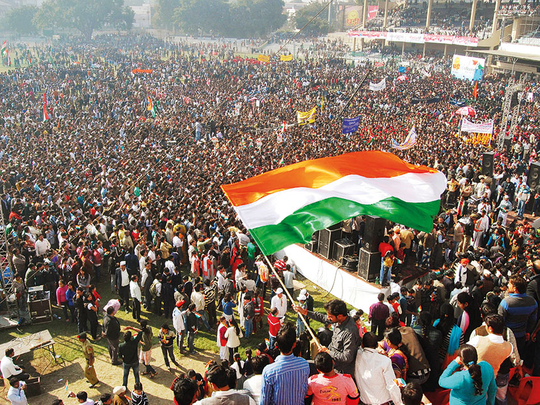
New Delhi: The national anthem has assumed centrestage in debates again, with the apex Supreme Court (SC) directing the Narendra Modi-government to take a call on whether or not playing it is to be made mandatory inside cinema halls.
The court observed that “one does not have to wear patriotism on one’s sleeves.”
“You (central government) take a call. The court would not allow you to shoot from its shoulders,” the SC Bench, headed by Chief Justice Dipak Misra, observed.
Justice Misra, who had last year made it mandatory for the national anthem to be played before every movie screening at cinema halls, was among the three judges who said that the government should decide whether to modify that order without being influenced by what the court had said.
“People do not need to stand up at a cinema hall to be perceived as patriotic. It cannot be assumed that if a person does not stand up for national anthem, then he is less patriotic,” the Bench said.
The government, however, argued that India is a diverse country and the national anthem can be a unifying force.
“By reasons of vast diversity based on religion, caste and region, it becomes necessary to have a unifying force which can be brought about by playing the national anthem in theatres. So when people come out of the theatre, they are all Indians,” Attorney General KK Venugopal told the court.
But the judges said that people go to movie halls for undiluted entertainment. The court asked the government to consider amending the national flag code if it wanted the anthem to be played in movie halls across the country.
“What is stopping you from amending the Flag Code? You can amend it and say where to play national anthem and where it can’t be done. Nowadays, the anthem is played during matches, tournaments and even Olympics where half of the crowd does not understand its meaning. In cinema halls, people go for undiluted entertainment,” Justice DY Chandrachud said.
The government has to respond by January 9, when the case will next be heard.
SC also indicated that it may modify its own order of November 2016, by replacing the word “shall” with “may.”
Responding to a petition by one Shyam Narayan Chouksey, the court last year had said that playing the national anthem before every show would “instil committed patriotism and nationalism and reflect love and respect for the motherland”.
However, the court’s fresh direction last month followed several reports of people being beaten up in cinema halls for not standing up while the anthem was played.
“It is clarified that when the national anthem is sung or played in the storyline of a feature film or as part of the newsreel or documentary, apart from what has been stated in the order dated November 30, 2016, the audience need not stand,” the court observed.
It, however, said its interim order of November, making it mandatory for cinema halls to play the national anthem before the screening of films, would continue until the government takes a call on it.
Appearing for Kodungallur Film Society, senior advocate CU Singh said forcing the national anthem on people in cinema halls would not promote nationalism.
Reacting to that, the apex court said, “we did not mean to do moral policing and the issue needed to be debated in a larger perspective. Our order may be correct or may be incorrect. This has to be debated and decided after hearing all sides. Next thing will be that people should not wear T-shirts and shorts to movies because it will amount to disrespect to the anthem. Where do we stop this moral policing?” Justice Chandrachud said.
The anthem
The national anthem of India is composed by poet Rabindranath Tagore. A formal rendition of the anthem takes approximately 52 seconds. A shortened version consisting of the first and last lines is also staged occasionally. The national anthem was first publicly sung on December 27, 1911, at the Calcutta (now Kolkata) Session of Indian National Congress.
It is played or sung on various occasions. Instructions have been issued from time to time about the correct versions of the anthem, the occasions on which these are to be played or sung, and about the need for paying respect to the anthem by observance of proper decorum on such occasions. The substance of these instructions has been embodied in the information sheet issued by the government of India for general information and guidance.












